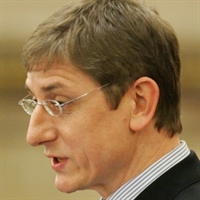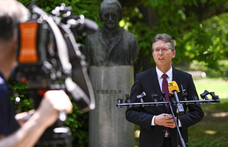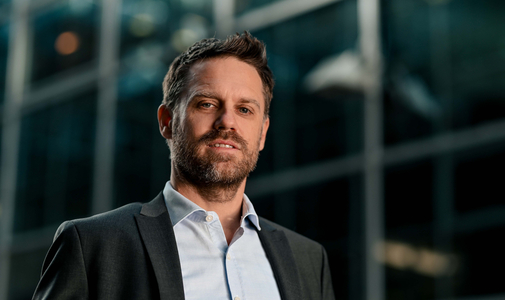 © Horváth Szabolcs |
How confident are you that Brussels will give Hungary's convergence programme the nod? Do you think speculation about this will have an effect on the outcome of the local elections?
There will be comments, suggestions, advice, and these will cloud the picture. But overall, Brussels will accept the programme. I don't think macroeconomic affairs will influence Hungarian voters, since they are already familiar with the situation. By now, even the opposition has stopped saying Brussels will reject the programme.
Influential analysts say that the programme does too little to cut expenditure, that key reforms are missing. But when I ask exactly what cuts they want to see, there tends to be a deafening silence. What reforms do they want?
Where in Europe is the government that managed to start work on a root-and-branch reform of the healthcare system in just three months, which has announced a fundamental restructuring of public administration, which has started work on reforming pensions and which is making process on higher education reform. Reform economists are talking about the mid-1990s. They are asking what remains on the table from the structural reform measures of the 1990s. Has the family support system changed? Lajos Bokros wanted to change it, but he couldn't. Has the financing of higher education changed? They wanted to change it, but they couldn't. After 16 years, we finally have a government that doesn't just talk about reforms, but actually carries them out. After just three months in office.
But the same coalition wasted the previous four years.I was prime minister before, but it wasn't the same government and it did not have the same political mandate. I said in the campaign that there would be no more social promises. There would be a new country with reforms, and, if necessary, I would get to work on the budget. That's what I'm doing now.
Raising taxes is bringing an immediate revenue boost, but it is damaging to competitiveness. When will you be able to get rid of these supposedly transitional supplementary taxes, replacing the current tax regime with something more modern?
Two governments have promised fundamental tax reform. The first was led by Viktor Orban, who spent years explaining why it was impossible. Then came our government. We developed a plan that we have had to put to one side. There were tax cuts, but we have had to correct them. That's why I am very cautious now. My view is that an effective tax regime cuts burdens on labour, on investments and on savings, and transfers the tax burden towards consumption and property. There is no argument about this, but when we do the sums, there are problems for everybody. That's when everybody falls silent.
But these tax increases could backfire. What's the guarantee that they won't drive everybody into the grey economy?
Health reforms based on the insurance principal will be the most effective way of preventing people from leaving the world of legal work - if they do, they won't get healthcare. That is why we have recruited more labour affairs inspectors. We have introduced new tax assessment systems to make it impossible for us to be a country of people supposedly on the minimum wage. As we all know, four fifths of people officially earning the minimum wage have another source of income. Is it normal that 40 per cent of all registered companies have suppposedly been loss-making for years?
The consulting fee for visiting the doctor will not bring in much revenue, but it will have very negative political consequences. Why are you doing this?The consulting fee is just an aspect of the reform. The most important thing is to implement the insurance principal. But we can't implement this unless people using the health service face a real downside. Why? Because unless the insured also contribute, they will not think carefully before using the service. It's not about money, but about making people take responsibility for their decisions. We have to rethink the demand side. Doctors will have to issue an itemised bill. This will bring an end to the illusion that healthcare is free. We will pay about 5 per cent of the cost of healthcare and prevention via the consulting fee, which isn't a lot of money.
How big are the social and economic risks presented by the programme? Will unemployment rise?
Every study conducted since 1998 has shown that cutting taxes does not create more jobs. This programme will of course have a shrinking effect on the domestic market, which is a genuine risk. Other risks come from the export market and the oil price. And nobody can predict the reactions of the Hungarian population and of the companies: maybe they will cut consumption radically, or maybe they will save more. Since we don't have detailed empirical data, I think this is the biggest risk.
You have also suggested holding a referendum on adopting the euro. Do you still support this idea?I do, but it's not a matter for a closed cabinet meeting. We have to talk about this. There needs to be a political and social obligation to confront the real consequences of a decision of this magnitude. I'm doing all I can to get that discussion started. I don't know whether there will need to be a referendum at the end. If we meet the criteria, then I'm in favour of a quick introduction, but I understand those who say we shouldn't rush.
The Socialist Party has thus far been disciplined in its support for you. But a defeat at the local elections in autum could undermine this firm support base. Peter Medgyessy, your predecessor, started losing control after losing the European elections.
You mustn't confuse the two situations. Even if we are both losing popularity. In Medgyessy's case, the party and the country were dissatisfied with the absence of a clear political programme. That's not the case now: we have very clearly defined policies. So the question is whether there is an alternative to the policies we are implementing. These are the only policies I can adopt, and I think the party understands this. I think the autumn elections will see the Socialists and Liberals winning in the politically important larger cities. But whatever the end result, on 22 October, at the party congress, I'm going to say: "This is what I can do." Anyone who disagrees should say what they want, and who they want to do it. It's much harder doing what we are doing than to carry out something like the 100-Step Programme, of course. But everyone told us we should chagne after 16 years. So lets get on with it!
IBOLYA JAKUS














